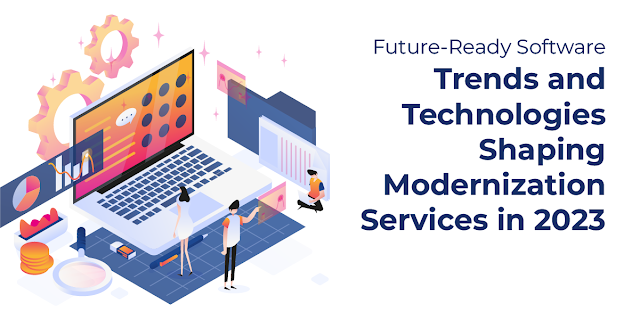Search This Blog
Niraj Jagwani is an engineer who has co-founded a number of businesses in the domain of software development services. He has successfully helped clients across industries increase revenues, optimize processes, and achieve new milestones. He is a passionate writer and loves to exchange ideas.
Featured Blogs
- Get link
- X
- Other Apps
Future-Ready Software: Trends and Technologies Shaping Modernization Services in 2023
Introduction
In the ever-evolving landscape of technology, the paradigm of software development is undergoing a revolutionary transformation. As we tread deeper into 2023, the horizon of modern software architecture and development is painted with fascinating trends that promise to reshape the way we approach software modernization. In this article, we dive into the realms of the future, uncovering the trends and technologies that are set to define software modernization services in the present year and beyond.
1. Hyper-Automation: Pioneering the Path
Hyper-automation is emerging as a transformative trend, bringing together artificial intelligence (AI), machine learning (ML), and robotic process automation (RPA) to streamline and optimize software modernization. Modernization services are no longer confined to manual efforts; they are now empowered by intelligent automation that accelerates migration, testing, and deployment. The synergy between human expertise and automated processes is becoming pivotal, saving time and resources while enhancing accuracy and efficiency.
2. Cloud-Centric Modernization: Where Possibilities Expand
Cloud-native approaches are no longer optional but integral to software modernization endeavors. The migration of legacy systems to cloud environments offers unparalleled scalability, agility, and cost-efficiency. Modern software architecture is increasingly leaning towards microservices, containers, and serverless computing, enabling seamless integration and ensuring applications are future-ready.
3. DevSecOps Evolution: Fusing Development, Security, and Operations
In the realm of modern software development, the integration of development, security, and operations (DevSecOps) is gaining significant traction. The emphasis on security is no longer an afterthought; it's woven into every stage of the development lifecycle. By embedding security practices within DevOps processes, modernization services are becoming inherently secure, reducing vulnerabilities and enhancing compliance.
4. Low-Code/No-Code Revolution: Democratizing Modernization
The low-code/no-code movement is democratizing software development and modernization services. With visual interfaces and pre-built components, even those without extensive coding expertise can actively contribute to modern software architecture. This trend accelerates the development and modernization processes, reducing dependency on specialized developers and opening doors for innovation from diverse domains.
5. AI-Driven Insights: Enhancing Decision-Making
Modern software development is generating vast amounts of data, and AI is stepping in to extract valuable insights. AI-driven analytics tools analyze development workflows, identifying bottlenecks, predicting issues, and suggesting optimization strategies. These insights not only accelerate the modernization process but also enhance decision-making, leading to better resource allocation and risk management.
6. Quantum Leap: Exploring Uncharted Territories
While still in its infancy, quantum computing holds the potential to revolutionize software modernization. Quantum algorithms could dramatically speed up tasks like optimization, simulation, and data analysis, fundamentally altering the landscape of modern software development. As the technology matures, it could become a game-changer, particularly for industries dealing with complex computational challenges.
7. Ethical and Sustainable Software: A Paradigm Shift
In the wake of increasing concerns about ethical and environmental sustainability, modern software architecture is evolving to embrace responsible practices. Developers and modernization services are focusing on reducing energy consumption, optimizing resource utilization, and ensuring that software solutions align with ethical guidelines. This shift not only reflects societal values but also prepares businesses for a future that prioritizes conscious technology.
8. Cross-Platform Consistency: The Omni-Channel Approach
Modern software development is no longer confined to a single platform. Cross-platform consistency has become paramount as applications need to seamlessly function across various devices and operating systems. Modernization services are emphasizing the creation of omni-channel experiences, ensuring a cohesive user experience regardless of the platform, be it mobile, web, or desktop.
Conclusion
In the dynamic landscape of technology, software modernization is not just about updating code and systems; it's about embracing a mindset that aligns with the future. The trends and technologies outlined in this article are shaping modernization services in 2023, paving the way for future-ready software that is agile, secure, and user-centric. As organizations embark on this journey of transformation, they must harness these trends to create software solutions that stand the test of time and innovation. The future of modern software architecture and development has never been more exciting, and the time to embark on this journey is now.
- Get link
- X
- Other Apps
Popular Posts
- Get link
- X
- Other Apps
Cloud Engineering: Navigating the Future of Digital Transformation
- Get link
- X
- Other Apps



Comments
Post a Comment